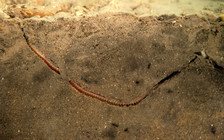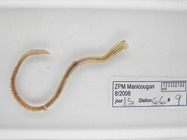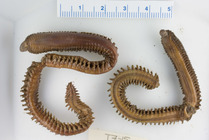
| Intro | | Search taxa | | Browse taxa | | Distributions | | Terminology | | References | | Statistics | | Online sources | | Tutorial | | Log in |
WoRMS taxon detailsNephtys Cuvier, 1817
129370 (urn:lsid:marinespecies.org:taxname:129370)
accepted
Genus
Aonis Savigny, 1822 · unaccepted (subjective synonym)
Dentinephtys Imajima & Takeda, 1987 · unaccepted (subjective synonym)
Diplobranchus Quatrefages, 1866 · unaccepted (objective synonym)
Nephthys [variant spelling of Nephtys] · unaccepted (subsequent misspelling for...)
subsequent misspelling for original Nephtys Nereis (Nephtys) Cuvier, 1817 · unaccepted (superseded incorrect...)
superseded incorrect recombination as subgenus, as Nephtys is not in Nereididae Portelia Quatrefages, 1850 · unaccepted (subjective synonym)
marine,
recent only
Cuvier, Georges L., 1817. Le règne animal distribué d'après son organisation : pour servir de base a l'histoire naturelle des animaux et d'introduction a l'anatomie comparée. VOLUME 4. Les Zoophytes, les Tables, et les Planches. Deterville, Paris., available online at http://www.biodiversitylibrary.org/item/17709
page(s): Additions & Corrections p.173 [details]
Note Type species generally said to be Nephtys...
From editor or global species database
Type species Type species generally said to be Nephtys hombergii Savigny MS in Lamarck (1818). Savigny (1822) as finally published refers to "Nephthys Hombergii. Cuv. Collect. et Règn; anim. tom. IV, pag. 173". However, N. hombergii is not mentioned at all by Cuvier (1817). Cuvier (1817) introduced in "especes de Nephtys" the following six species listed as their original names in Nereis. (Nereis ciliata [Muller, 1776 = Nephtys], Nereis stellifera [Muller, 1788 = Sigalion], Nereis alba [Muller 1776 = Glycera], Nereis maculata [Linnaeus, 1767 = Phyllodoce], Nereis crassa [Gmelin in Linnaeus, 1788 = Nereis], and 'peut-etre aussi' Nereis punctata [Müller, 1788 = Nereimyra]). Thus N. hombergii was not originally included and cannot be the type species (ICZN Art.67.2) unless it is a synonym of one of the originally included species. Only Nephtys ciliata seems eligible for type species status.[details]
Etymology If Cuvier and Lamarck derived 'Nephtys' from the mythological 'Nephthys', the spelling used by some taxonomists,...
Etymology If Cuvier and Lamarck derived 'Nephtys' from the mythological 'Nephthys', the spelling used by some taxonomists, influentially including Savigny in "Description de l'Égypte ..." (finally published 1822), then they used a variant spelling of the name adopted in Greek for an Egyptian goddess, transliterated from heiroglyphs as Nebet-het, sister of Isis and Osiris, and companion of Set (see e.g., Wikipedia on Nephthys ). [details]
Read, G.; Fauchald, K. (Ed.) (2024). World Polychaeta Database. Nephtys Cuvier, 1817. Accessed through: World Register of Marine Species at: https://www.marinespecies.org/aphia.php?p=taxdetails&id=129370 on 2024-11-07
Date action by
original description
Cuvier, Georges L., 1817. Le règne animal distribué d'après son organisation : pour servir de base a l'histoire naturelle des animaux et d'introduction a l'anatomie comparée. VOLUME 4. Les Zoophytes, les Tables, et les Planches. Deterville, Paris., available online at http://www.biodiversitylibrary.org/item/17709
page(s): Additions & Corrections p.173 [details] original description (of Dentinephtys Imajima & Takeda, 1987) Imajima, Minoru and Takeda, Yasuyo 1987. Nephtyidae (Polychaeta) from Japan. II. The genera Dentinephtys and Nephtys. Bulletin of the National Science Museum, Tokyo, Ser. A (Zoology), 13(2): 41-77. page(s): 43 [details] original description (of Portelia Quatrefages, 1850) Quatrefages, Armand de. (1850). Sur la respiration des annélides. <em>Annales des Sciences Naturelles, Paris.</em> Série 3, 14: 290-301., available online at https://www.biodiversitylibrary.org/page/13433737 page(s): 292 [details] original description (of Aonis Savigny, 1822) Savigny, Jules-César. (1822). Système des annélides, principalement de celles des côtes de l'Égypte et de la Syrie, offrant les caractères tant distinctifs que naturels des Ordres, Familles et Genres, avec la Description des Espèces. <em>Description de l'Égypte ou Recueil des Observations et des Recherches qui ont été faites en Égypte pendant l'Expédition de l'Armée Française, publié par les Ordres de sa Majesté l'Empereur Napoléon le Grand, Histoire Naturelle, Paris.</em> 1(3):1–128., available online at http://biodiversitylibrary.org/page/41329897 page(s): 45 [details] original description (of Diplobranchus Quatrefages, 1866) Quatrefages, A. de. (1866 (1865)). Histoire naturelle des Annelés marins et d'eau douce. Annélides et Géphyriens. <em>Librarie Encyclopédique de Roret. Paris.</em> <b>Volume 1.</b> 1-588., available online at http://books.google.com/books?id=FV9IAAAAYAAJ page(s): 433 [details] additional source Fauchald, K. (1977). The polychaete worms, definitions and keys to the orders, families and genera. <em>Natural History Museum of Los Angeles County: Los Angeles, CA (USA), Science Series.</em> 28:1-188., available online at http://www.vliz.be/imisdocs/publications/123110.pdf [details] additional source Bellan, G. (2001). Polychaeta, <i>in</i>: Costello, M.J. <i>et al.</i> (Ed.) (2001). European register of marine species: a check-list of the marine species in Europe and a bibliography of guides to their identification. <em>Collection Patrimoines Naturels.</em> 50: 214-231. (look up in IMIS) [details] additional source Day, J. H. (1967). [Errantia] A monograph on the Polychaeta of Southern Africa. Part 1. Errantia. British Museum (Natural History), London. pp. vi, 1–458, xxix., available online at http://www.biodiversitylibrary.org/bibliography/8596 [details] additional source Glasby, Christopher J.; Read, Geoffrey B.; Lee, Kenneth E.; Blakemore, R.J.; Fraser, P.M.; Pinder, A.M.; Erséus, C.; Moser, W.E.; Burreson, E.M.; Govedich, F.R.; Davies, R.W.; Dawson, E.W. (2009). Phylum Annelida: bristleworms, earthworms, leeches. <em>[Book chapter].</em> Chapt 17, pp. 312-358. in: Gordon, D.P. (Ed.) (2009). New Zealand inventory of biodiversity: 1. Kingdom Animalia: Radiata, Lophotrochozoa, Deuterostomia. Canterbury University Press, Christchurch. [details] Available for editors identification resource Dixon-Bridges, Kylie; Gladstone, William; Hutchings, Patricia A. (2014). One new species of <em>Micronephthys</em> Friedrich, 1939 and one new species of <em>Nephtys</em> Cuvier, 1817 (Polychaeta: Phyllodocida: Nephtyidae) from eastern Australia with notes on <em>Aglaophamus</em> <em>australiensis</em> (Fauchald, 1965) and a key to all Australian species. <em>Zootaxa.</em> 3872(5): 513-540., available online at https://doi.org/10.11646/zootaxa.3872.5.5 page(s): 531 [tabulation of Australian and Indo-pacific species of Nephtys]] [details] Available for editors identification resource Hossain, M. Belal; Hutchings, Pat. (2016). <em>Nephtys bangladeshi</em> n. sp., a new species of Nephtyidae (Annelida: Phyllodocida) from Bangladesh coastal waters. <em>Zootaxa.</em> 4079(1): 41-52., available online at http://biotaxa.org/Zootaxa/article/view/zootaxa.4079.1.3 page(s): 48; note: Table of Indo-Pacific Nephtys species [details]  Present Present  Inaccurate Inaccurate  Introduced: alien Introduced: alien  Containing type locality Containing type locality
From editor or global species database
Etymology If Cuvier and Lamarck derived 'Nephtys' from the mythological 'Nephthys', the spelling used by some taxonomists, influentially including Savigny in "Description de l'Égypte ..." (finally published 1822), then they used a variant spelling of the name adopted in Greek for an Egyptian goddess, transliterated from heiroglyphs as Nebet-het, sister of Isis and Osiris, and companion of Set (see e.g., Wikipedia on Nephthys ). [details]Habitat Open softshore beaches, but also offshore to deepsea [details] Spelling Cuvier first edition "Le Règne Animal ..." (1817 vol.4, p.173) introduces Nephtys, and Lamarck (1818:314) follows that spelling, whether or not it is the same as in Savigny's MS, whereas subsequent 1830 and 1836 editions of Cuvier use the spelling Nephthys as in the Greek form of the name. As finally published Savigny's "Description de l'Égypte ..." (1822) has the Nephthys form. The spelling Nephtys as first published must be followed, and for example Quatrefages (1866:420) adheres to that spelling. But others did not. Prevailing usage today follows the original spelling. [details] Type species Type species generally said to be Nephtys hombergii Savigny MS in Lamarck (1818). Savigny (1822) as finally published refers to "Nephthys Hombergii. Cuv. Collect. et Règn; anim. tom. IV, pag. 173". However, N. hombergii is not mentioned at all by Cuvier (1817). Cuvier (1817) introduced in "especes de Nephtys" the following six species listed as their original names in Nereis. (Nereis ciliata [Muller, 1776 = Nephtys], Nereis stellifera [Muller, 1788 = Sigalion], Nereis alba [Muller 1776 = Glycera], Nereis maculata [Linnaeus, 1767 = Phyllodoce], Nereis crassa [Gmelin in Linnaeus, 1788 = Nereis], and 'peut-etre aussi' Nereis punctata [Müller, 1788 = Nereimyra]). Thus N. hombergii was not originally included and cannot be the type species (ICZN Art.67.2) unless it is a synonym of one of the originally included species. Only Nephtys ciliata seems eligible for type species status. [details]
|




